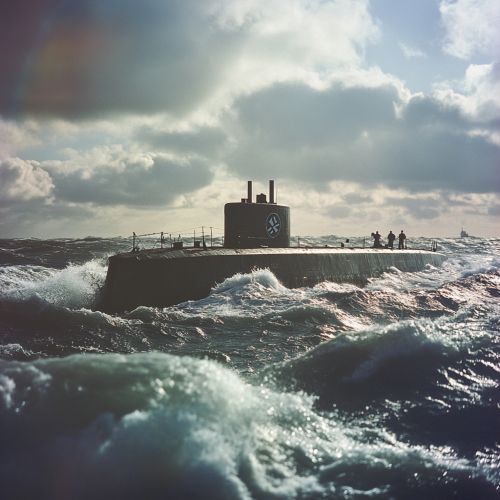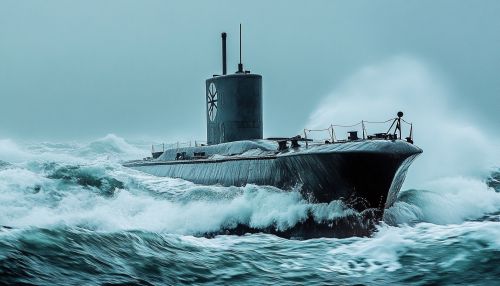Karl Dönitz
Karl Dönitz was born on September 16, 1891, in Grünau, a suburb of Berlin, Germany. He was the son of Emil Dönitz, an engineer, and Anna Beyer. Dönitz's early education was typical of the German middle class at the time, and he developed an interest in the navy at a young age. In 1910, he joined the Imperial German Navy as a sea cadet, beginning a career that would span several decades and two world wars.
Dönitz's early naval career was marked by rapid advancement. By 1913, he had been promoted to the rank of Leutnant zur See (equivalent to a junior officer rank). During World War I, Dönitz served on the light cruiser SMS Breslau and later transferred to the U-boat arm, where he commanded U-39. His experiences during the war, particularly in submarine warfare, would shape his strategic thinking in later years.
Interwar Period and Rise in the Kriegsmarine
Following the end of World War I, Dönitz remained in the navy, which was significantly reduced in size due to the Treaty of Versailles. During the interwar period, he continued to develop his expertise in submarine warfare. The restrictions imposed by the treaty led to innovative thinking within the German naval command, and Dönitz was at the forefront of developing new tactics and technologies for U-boats.
In 1935, with the rise of the Nazi Party and the rearmament of Germany, Dönitz was appointed to command the first U-boat flotilla. He was instrumental in rebuilding the U-boat fleet, emphasizing the importance of wolfpack tactics, where groups of submarines would attack enemy convoys simultaneously. This approach was designed to overwhelm the convoy's defenses and maximize the effectiveness of the U-boat fleet.
World War II and the Battle of the Atlantic


During World War II, Dönitz played a crucial role in the Battle of the Atlantic, which was a prolonged military campaign to control the Atlantic sea routes. As the commander of the U-boat arm, Dönitz implemented his wolfpack tactics with devastating effect, causing significant losses to Allied shipping. His strategic acumen earned him a promotion to Admiral in 1942 and later to Grand Admiral in 1943, making him the highest-ranking officer in the Kriegsmarine.
Dönitz's leadership during the Battle of the Atlantic was characterized by his ability to adapt to changing circumstances. He was adept at using intelligence, such as intercepted radio communications, to position his U-boats effectively. However, the Allies' development of improved anti-submarine warfare tactics and technologies, such as sonar and depth charges, gradually diminished the effectiveness of the U-boat campaign.
Appointment as Hitler's Successor
In the final days of the Third Reich, Adolf Hitler named Dönitz as his successor, bypassing more senior Nazi officials. This decision was influenced by Hitler's trust in Dönitz's loyalty and competence. On April 30, 1945, following Hitler's suicide, Dönitz became the President of Germany and the Supreme Commander of the Armed Forces.
As head of the Flensburg Government, Dönitz's primary objective was to negotiate a surrender that would minimize the suffering of the German people and prevent further destruction. On May 8, 1945, Dönitz authorized the unconditional surrender of all German forces, effectively ending World War II in Europe.
Post-War Trial and Imprisonment
After the war, Dönitz was arrested by Allied forces and charged with war crimes at the Nuremberg Trials. He was accused of waging unrestricted submarine warfare and other violations of international law. During the trial, Dönitz defended his actions by arguing that similar tactics were employed by other nations during the war.
Despite his defense, Dönitz was found guilty on two counts: crimes against peace and war crimes. He was sentenced to ten years in prison, which he served at Spandau Prison in Berlin. Dönitz was released in 1956 and retired to the small village of Aumühle in northern Germany.
Later Life and Legacy
In his later years, Dönitz wrote two memoirs, "Ten Years and Twenty Days" and "Memoirs: Ten Years and Twenty Days," which provided insights into his military career and perspectives on the war. He lived a relatively quiet life until his death on December 24, 1980.
Dönitz's legacy is a complex one. He is remembered for his strategic innovations in submarine warfare and his role in the Battle of the Atlantic. However, his association with the Nazi regime and his actions during the war have also been subjects of controversy and debate. Historians continue to examine his impact on naval warfare and his place in the broader context of World War II history.
